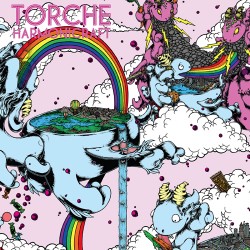As far as metal bands go, not many are known for being as melodically diverse yet as indie cred-soaked as Torche.
Slouching toward pop metal
As far as metal bands go, not many are known for being as melodically diverse yet as indie cred-soaked as Torche.

This hasn’t always been the band’s reputation. Ever since the band’s self-titled full-length in 2005, leading up to 2011’s split with Part Chimp, Torche has consistently introduced more melodic elements to its music.
With 2012’s Harmonicraft, has Torche finally jumped the melodic shark?
In light of “Charge of the Brown Recluse,” track A1 from Torche’s eponymous debut, the metal community knew that Torche meant business. Every few seconds, Torche’s drop A tuning rattles off a thunderous roar that pounds in the listener’s chest. This opening track gave Torche a solid foundation to go meandering off into harmonies and other such softness.
Torche itself knows exactly where it’s headed, and they want the listener to know that, though Harmonicraft is heavy on the melody, there are touches of bone-crushing heaviness in store.
Unfortunately, this is where things get messy and provide Torche fans with the other melodic shoe they’ve been waiting to drop. Harmonicraft attempts to free itself from the pop shackles that Torche’s last album, 2008’s Meanderthal, put them in. The first step in breaking these chains is “more bass,” and this quickly becomes the theme to Harmonicraft.
Most metal fans will agree that the bass player is the least integral member of any metal outfit. Torche only somewhat agrees. The entirety of Harmonicraft is filled with bass-soaked dirges that continue well beyond the point that the band tries to maintain heaviness.
Seconds into “Letting Go,” the album’s opener, your speakers will be spewing forth low frequencies like an 18-wheeler belches diesel fumes. While this is all fine and dandy, it’s well-nigh impossible to tell if this is coming from the bass guitar or whatever else. The gut-rumbling low end—a sonic staple of Torche since the band’s debut—almost seems like an afterthought at this point, and the record suffers greatly as a result.
Sad to say, metal records rely heavily on a master’s hand in the studio, or a lack thereof (read: any black metal record ever), and Torche comes off as face-palming-ly amateur as a result. Meanderthal is beautifully mastered. What happened?
While Torche still packs enough gear firepower to push entire crowds around the room, they appear to take a different direction on Harmonicraft. The now bold-faced pop sensibilities meet octave-up fuzz-tinged guitar solos, where the driving riffs Torche once employed now seem to get much less use.
This isn’t to say that Torche has lost their riffing edge; “Reverse Inverted” is a wonderful symbiote of Torche styles old and new. That said, the track may shake a lot of Torche fans from the band’s collective short-and-curlies because it’s easy, upon hearing it, to throw one’s hands in the air and wonder where this flavor of synthesis was on the tracks before it. After the aforementioned track and its follow-up, “In Pieces,” the band once again embarks on the road to pop metal.
Don’t believe me? Listen to “In Pieces,” then follow it up immediately with “Snakes Are Charmed,” which feels like a bunch of guys in leather jackets getting drunk, then playing Chutes and Ladders. The following track, “Sky Trials,” attempts to shake the user out of the shock of “Snakes Are Charmed.” But alas, it is too late. That Chutes and Ladders analogy will stick with you forever.
It needs to be said that the record isn’t as much of a bummer as the bulk of reviews would lead you to believe. However, the production sucks and the bad tracks are truly, terrifyingly awful. The record refreshingly offers some old Torche throwback sludge on “Solitary Traveler,” which sounds welcomingly akin to some of Torche’s more soul-reaving cuts of yore, like 2005’s “Fire.”
However, one track on Harmonicraft stands far above the rest: the final track, “Looking On.” The song starts out with Torche’s trademark haunting vocals over a riff so heavy that you feel grimier than the Yamhill Pub’s bathroom after hearing it. The tempo is a very stoner-friendly 60 BPM, and the song is the longest one on the record by far.
“Looking On” is the decoder ring in your Cracker Jack box, the prize in the bottom of your cereal and the sweet center of the Warhead your friend tricked you into eating. Eventually, the track devolves into a thunderous riff, drenched in rich harmonic feedback and a muggy, cloying cacophony. “Looking On” is how every metal record should end from now until the demise of the genre.
While Harmonicraft will likely polarize longtime fans of Torche, it could also bring the band legions of new fans. Whether that is a good thing remains to be seen. But one thing is decidedly clearer than anything else: If “Looking On” is in any way titular-ly indicative of Torche’s future output, may God help ye, fair-weather metal fan.
Harmonicraft
Volcom Entertainment
Out now
3/5 stars





